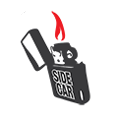
By Lachy Banton on Friday, October 7th, 2016 in Uncategorised.
I was watching Indiana Jones and the Last Crusade the other day and a particular scene got me thinking. It’s the part where obsessed antiquities collector Walter Donovan selects the wrong holy grail cup and rapidly ages to death. I thought how it’s almost a fitting metaphor for radio writing spots and SEO website copywriting.
You see, Donovan didn’t really know his audience (the King of Kings, Jesus Christ) and that lack of knowledge lead him to selecting the wrong cup. Just like writing radio spots, if you don’t know your audience, you’ll write something that doesn’t resonate. And if you write a script that doesn’t resonate with the target market, your client will most certainly come back to you asking for rewrites. And that will make you age rapidly. Perhaps not to death.
What does this have to do with SEO copywriting for websites? A lot. Stay with me while I attempt to string this all together in 7 thought-starter style tips. Trust me, it’ll be fun.
1. Define Your Audience
Just like on the radio, online you need to have a clear picture of who you’re speaking to. When this is clear, you’ll connect with your audience and your content will resonate with them. Write a profile of your ideal customer: are they male or female? How old are they? What’s their favourite song? What music do they listen to? What hobbies do they have? Where do they work? If it’s not sticking, the phone won’t be ringing and your bounce rates will stay the same… or worse yet, get higher!
2. Labour Over Headlines
A headline on a web page is a lot like the creative ‘top’ or intro of a radio spot. It sets the tone for the ad, grabs attention and holds it there. Give your audience just enough detail so they know what they’re about to read. Use numbers, allude, hint, pump up their interest.
3. Add Emphasis
It may not directly impact your SEO efficacy, but it certainly helps boost readability – and that’s always a good thing. Do this by using bold or italics on the points or words you really want to drive home. Doing this also helps the reader ‘hear’ your tone of voice in their head.
4. Use Similar Language
On the radio, listeners will tune out so fast it will make your hat spin if they hear something they disagree with or doesn’t sound familiar. This could come down to the language you use, the tone of voice present or even music. The same goes online, don’t use industry language – be conversational as your brand will allow. You want your audience to feel as if you’re right there in the room with them.
5. Fonts Matter
The font you use is an extension of your company’s personality – it’s brand. If it were a radio spot, it would be the voice – and a lot of thought goes into voice selection. Not only will selecting the right font make your copy easier to read, which in turn will keep visitors on the page longer, but it makes your site more interesting. If the majority of your traffic is from mobile visitors, consider selecting a font that’s designed for these devices. Yeah, there’s a font for that.
6. Vary Sentence/Paragraph Lengths
Varying your sentence and paragraph lengths is good for two reasons. Firstly, it helps break up important information. That makes it easier for your readers to digest. Secondly, it helps readers ‘hear’ the tone of the content in a more conversational tone. If you have more than 5 sentences in a paragraph, start culling.
7. Tell Them What To Do
Your visitors are busy people. They don’t have time to think. Heck, they barely read – instead just skimming your web page, brochure, blog post for information that interests them. So naturally, they need to be told what to do. Flick on the radio and listen to any ad on any station – I’m willing to bet they all end with a clear call to action.
Be clear, be succinct.
If you’ve skimmed the above 7 points, let me put a bow on it for you: write for humans, optimise for robots. No matter what digital companies may tell you, the SEO landscape is forever changing. Just when you think you understand it, the rug will be pulled out from under you. The safest option is to write thoughtful, clever, interesting and succinct content. Don’t write with an agenda. Don’t stuff keywords in. Be helpful. If you can do that, the rest will fall into place.
– Lachy Banton
